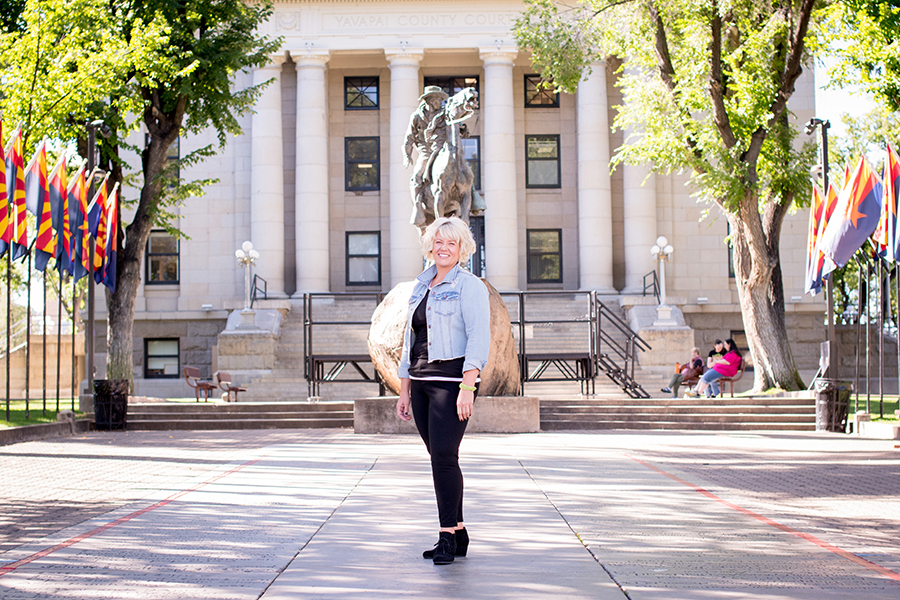The Coalition for Compassion and Justice’s Team of Problem Solvers Takes an Agile, Personalized Approach to Helping the Most Vulnerable Members of Society Thrive
By Hilary Dartt • Photo by Trisha Shaffer
T
he Coalition for Compassion and Justice (CCJ) has a simple mission: to provide vital services, education, and advocacy for those living in poverty, leading to self-sufficiency and a fair and just community for all.
And on the surface, the methods CCJ’s staff and volunteers employ to carry out that mission seem simple, too. In short, they help people get what they need to thrive.
On a deeper level, though, CCJ’s work is intricate and ever changing. It’s individualized and personalized. Thanks to the fact that it’s mostly privately funded, CCJ has a unique ability to meet clients where they are, to be agile, and to provide relevant, personalized solutions to the challenges people face.
The organization, according to Executive Director Jessi Hans, serves as a net to catch those whose needs aren’t met by other service organizations.
When she first took on her role at CCJ, she said, “I just fell in love with this work, the people that we serve, and the way we collaborate in our community. Our clients deserve to be seen and met where they are and encouraged to explore their potential.”
This means that in many cases, staff members are creating new systems to support society’s most vulnerable adults as they strive to better their lives, whether that means finding housing, securing jobs, getting sober, getting control of their finances, improving their mental health, or establishing strong connections with members of a community. Jessi said, “People want to move into a better place. We try to overcome the challenges that get in the way.”
“We’ve seen the approach of coming alongside our clients work over and over again, lending to the building up of resilience necessary to continue to move forward on their own.”
CCJ’s assistant director Allison Lenocker summarized it this way: “CCJ’s entire being is rallying around problems, asking, ‘How can we fix this and how can we help this person?’”
Typically folks who seek help from the CCJ, Allison said, feel like they’ve tried everything. So, when the CCJ team seeks solutions, the feeling is, “How creative do we need to get?”
No idea is too unusual, wacky, crazy or too anything.
“Let’s throw something at the wall and see if it sticks,” Allison said. “And if it doesn’t, we’ll try something else.”
While CCJ’s clients often face barriers, CCJ’s staff strives to get around them.
Jessi said, it’s all about keying in on whether CCJ’s employees or volunteers can help someone right now, how they can do it, and, if they can’t, finding someone who can.
(Jessi said the nonprofit organizations in the Prescott area are uniquely collaborative, making an effort not to duplicate services and, together, through the Collective Impact Partnership, to focus on areas of need including emergency shelter, transportation, affordable housing, and coordinated services.)
Through a variety of outreach programs, the CCJ staff and volunteers dig deep into their client’s lives to help them overcome hurdles between where they are now and where they envision themselves being.
By building a strong, healthy community and helping clients access the services and solutions that will help them overcome their challenges, Jessi said, “We connect them, hoping to instill within them the sense that, ‘I can be better tomorrow than I am today.’ What does that look like? They see other people becoming sober, getting jobs, getting into homes, and they think, ‘That looks right to me, that’s what I want. How do I get there?’”
The Stagger Straight Community Emergency Shelter provides overnight shelter and daily activities including skill training, job search assistance, education, recovery meetings, nutrition, and more.
Through the Prescott Worker’s Progress Agency, CCJ contracts for jobs or projects with the City of Prescott as well as private companies and citizens, and then sends a crew of
(Continued on page 69)
Seen, Save & Equipped
(Continued from page 65)
CCJ client employees to complete those jobs or projects. So far, these projects have included moving, landscaping, cleaning, leaf removal, and snow removal, and, Jessi said, while the work is providing foundational job skills for the employees, it’s working out great for the CCJ partners, too: “We’ve received rave reviews on the work.”
For low-income homeowners, the CCJ offers home repair designed to ensure the houses are safe, weatherized and energy efficient so residents can continue living in them.
The CCJ’s Second Chance Housing program uses several different housing models to provide clients with an affordable home—and with dignity, safety, and a sense of community.
Other programs include the Daily Bread Café and Pantry and Open Door Advocacy (where people can get food and other supplies as well as vital services), the CCJ Thrift Store (where people can get clothing vouchers, employment experience and volunteer), and the Little Tree House, where parents can come to receive food and services (like computer access, job search, and more) while their children play.
As the CCJ team works on the strategic plan for 2019, Jessi said, the organization’s overarching goal is to prevent homelessness.
For more information about the Coalition for Compassion and Justice, to donate (money or other items), or to fill out a volunteer application, visit www.yavapaiccj.org, call 928.445.8382, or email ccjdirector@gmail.com. Donations to the privately funded CCJ are tax deductible.

